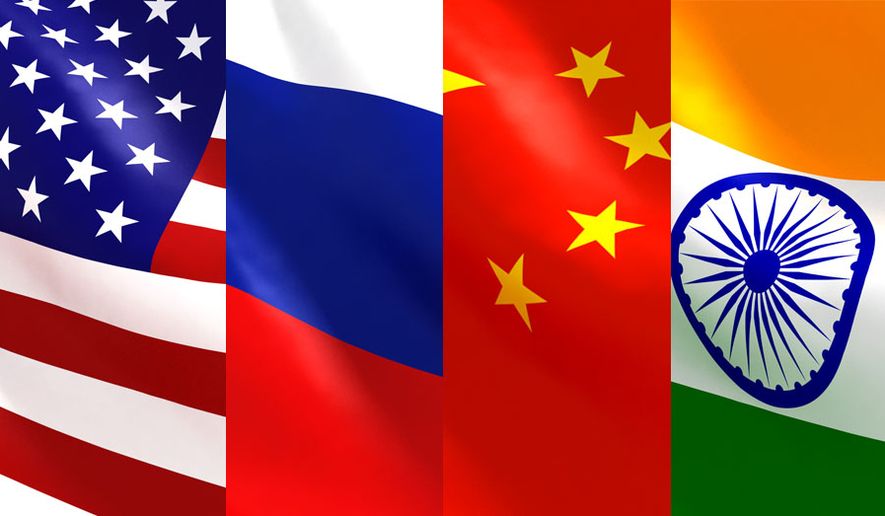OPINION:
The recent naval incident in the Kerch Strait connecting Crimea to the Russian mainland smells of a provocation by Ukrainian President Petro Poroshenko desperate to pull his approval ratings out of single digits in advance of next year’s election. The immediate target of this gambit – straight out of the 1997 movie Wag the Dog – is to derail a meeting between President Donald Trump and Russia’s Vladimir Putin at this week’s G20 in Argentina.
Trump must not fall for it. As with increasing tensions with Beijing over US naval probing in the South China Sea, the Kerch incident shows once again that risks of direct military conflict between the US and Russia and China are on the rise.
Signs point toward what was once unthinkable: World War III. The United Nations, which was supposed to help ensure global peace and security, seems not up to the task.
Not only that, there’s increasing concern that it’s a war the US might not win. “US military superiority is no longer assured and the implications for American interests and American security are severe,” said a new report by the National Defense Strategy Commission, an independent agency authorized by Congress. The US “might struggle to win, or perhaps lose, a war against China or Russia.”
Predictably, the response has been to insist the US military is underfunded and to demand more money be thrown at the problem. This is despite the fact that our military budget is already roughly ten times that of Russia’s and three times larger than China’s. Maybe the real problem is not one of lack of funds.
Besides, even if money could solve the problem, we don’t have it. “What would transpire if Social Security checks stopped showing up in mailboxes and Medicare benefits got cut off?” asks Hunter DeRensis in The American Conservative. “When presented with that choice, will the average American choose his social safety net or continued funding for far-flung bases in Stuttgart, Okinawa, and Djibouti?”
Moreover, what has the so-called unipolar security maintenance of our planet gotten us? Is the world or for that matter America safer than during the Cold War?
Actually, if we see what is going in Afghanistan, Iraq, Libya, Syria, Yemen – where the US military is actively involved – not only have these countries been devastated, some of them became even more fertile ground for Islamic terrorism. The US military is also involved in Ukraine where the 2014 western-backed coup not only resulted in making this country among the poorest in Europe but stoked neo-Nazi violence – belatedly discovered even by the Swamp-critters.
There is a better way. Rather than doubling or tripling down on a futile and dangerous quest to maintain a fading unipolar global domination and power projection, the US can accept a multipolar future in which the US would remain the first among equals for the foreseeable future.
This means coming to terms first of all with the two giants the National Defense Strategy Commission worries about going to war with: Russia and China. As we recommended following Donald Trump’s election: “Rather than adversaries Russia and China can become America’s essential partners and are, we are convinced, ready to respond positively. It’s time for Trump and America to take the initiative for U.S-Russia-China cooperation towards a secure, prosperous, and peaceful future.” Trump’s meeting this week with Putin and with China’s Xi Jinping can help move that forward.
It’s now perhaps time to consider another important man for inclusion: Prime Minister Narendra Modi of India. A demographic giant on a par with China, India is a nuclear power with a burgeoning economy. Long on friendly terms with Moscow, New Delhi has worked to sort out its sometimes acrimonious relationship with Beijing too.
Adding one more item to the alphabet soup of global groupings – USRIC (United States, Russia, India, and China) – makes sense. It would also be nice to include a proverbial fifth wheel in the form of Europe, but at this time that may not be possible. Neither the UK, France, Germany, nor any other single European country is of sufficient stature. As for the European Union itself, the notion of, say, Jean-Claude Juncker or Donald Tusk sharing the stage with Trump, Putin, Xi, and Modi doesn’t pass the laugh test.
If Trump succumbs to pressure to cancel his meeting with Putin it would be a mistake of historic proportions. It would signal abandonment of his 2016 his “America First” common sense agenda and submission to the Deep State that has sought to block him at every turn and still conspires to remove him from office.
Instead, we urge the President to meet with Putin, as well as with Xi and Modi, and consider calling a Big Four USRIC summit in the near future. The G20 meeting is a perfect opportunity at least to test the waters. He must not waste it.
• Edward Lozansky is president of the American University in Moscow. He is the author of the book Operation Elbe, which describes joint US-Russia anti-terrorist efforts. Jim Jatras is a former U.S. diplomat and former foreign policy adviser to the Senate GOP leadership.




Please read our comment policy before commenting.